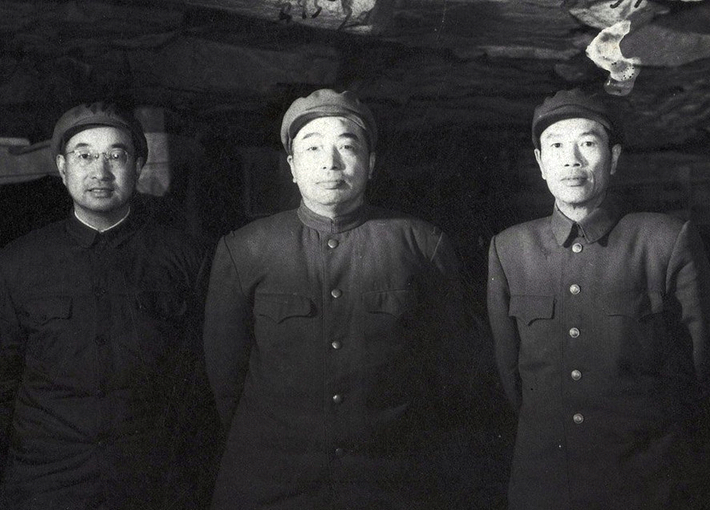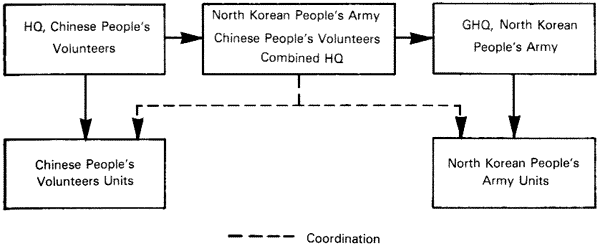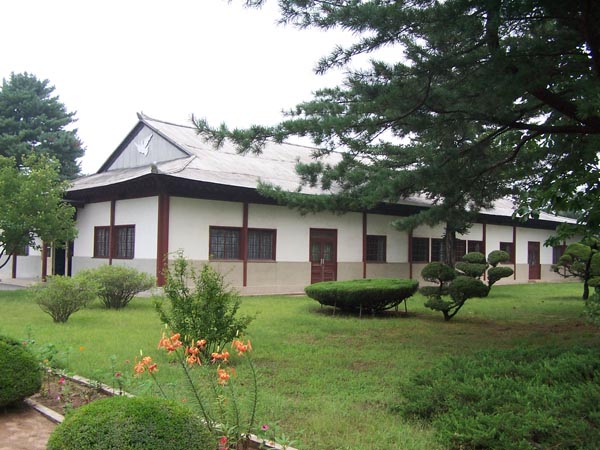|
People's Volunteer Army
The People's Volunteer Army (PVA), officially the Chinese People's Volunteers (CPV), was the armed expeditionary forces China in the Korean War, deployed by the History of the People's Republic of China (1949–1976), People's Republic of China during the Korean War. Although all units in the PVA were actually transferred from the People's Liberation Army (PLA) under the orders of Chairman of the Chinese Communist Party, Chairman Mao Zedong, the PVA was separately constituted in order to prevent an official war with the United States. The PVA entered Korea on 19 October 1950 and completely withdrew by October 1958. The nominal commander and political commissar of the PVA was Peng Dehuai before the Korean Armistice Agreement, ceasefire agreement in 1953, although both Chen Geng and Deng Hua served as the acting commander and commissar after April 1952 following Peng's illness. The initial (25 October – 5 November 1950) units in the PVA included 38th, 39th, 40th, 42nd, 50th, 66 ... [...More Info...] [...Related Items...] OR: [Wikipedia] [Google] [Baidu] |
People's Liberation Army Ground Force
The People's Liberation Army Ground Force (PLAGF), also referred to as the PLA Army, is the army, land-based service branch of the People's Liberation Army (PLA), and also its largest and oldest branch. The PLAGF can trace its lineage from 1927 as the Chinese Red Army; however, it was not officially established until 1948. History In February 1949, the existing large number of armies and divisions were regularized into up to seventy armies of three divisions each. While some, such as the 1st Army (People's Republic of China), 1st Army, survived for over fifty years, a number were quickly amalgamated and disestablished in the early 1950s. It appears that twenty per cent or even more of the seventy new armies were disestablished up to 1953; in 1952 alone, the 3rd Corps (People's Republic of China), 3rd, 4th Corps (People's Republic of China), 4th, 10th Corps (People's Republic of China), 10th, 17th Corps (People's Republic of China), 17th, 18th Corps (People's Republic of C ... [...More Info...] [...Related Items...] OR: [Wikipedia] [Google] [Baidu] |
China In The Korean War
China became a late but important belligerent during the Korean War and played a significant role in the conflict. The People’s Republic of China entered the conflict in October 1950, with the Chinese People’s Volunteer Army (PVA) units crossing the Yalu River in secret, in support of the North Korea. Subsequently, Chinese forces launched multiple major campaigns against United Nations (UN) forces and South Korean troops, playing a crucial role in prolonging and shaping the war’s outcome. Throughout the conflict, the PVA engaged in extensive combat operations, logistics build-up, and defensive strategies, eventually deploying over one million personnel at the height of its involvement. The Chinese intervention influenced both battlefield dynamics and the broader geopolitical landscape, contributing to the eventual stalemate and the signing of the Korean Armistice Agreement in 1953. The PVA's participation resulted in significant casualties and economic costs for China, but ... [...More Info...] [...Related Items...] OR: [Wikipedia] [Google] [Baidu] |
Korean Volunteer Army
The Korean Volunteer Army (), was an armed wing of the Chosŏn Independence Alliance, formed in 1942 by reorganizing the North China branch of the Chosŏn Volunteer Corps. Based in Taihang Mountain, they fought an armed struggle against the Japanese until the end of World War II. They were disbanded and many of them were incorporated into the Korean People's Army. At the time of the establishment of the Democratic People's Republic of Korea, they were called the Yan'an faction, but were purged until 1958 after the Korean War. Background In 1937, the Korean National Revolutionary Party, the Korean Youth Vanguard League, the Korean National Liberation League, and the Korean Anarchist League, which had been campaigning for independence in China after the second national-communist cooperation, had a joint meeting in Wuhan, Hubei Province, and established the Korean National Front Federation. The Chosŏn Volunteer Corps was formed as an armed force under it. The Chosŏn National Re ... [...More Info...] [...Related Items...] OR: [Wikipedia] [Google] [Baidu] |
Zhou Enlai
Zhou Enlai ( zh, s=周恩来, p=Zhōu Ēnlái, w=Chou1 Ên1-lai2; 5 March 1898 – 8 January 1976) was a Chinese statesman, diplomat, and revolutionary who served as the first Premier of the People's Republic of China from September 1954 until Death of Zhou Enlai, his death in January 1976. Zhou served under Chairman Mao Zedong and aided the Chinese Communist Party, Communist Party in rising to power, later helping consolidate its control, form its Foreign policy of China, foreign policy, and develop the Economy of China, Chinese economy. As a diplomat, Zhou served as the Chinese Foreign Minister of the People's Republic of China, foreign minister from 1949 to 1958. Advocating peaceful coexistence with Western Bloc, the West after the Korean War, he participated in the 1954 Geneva Conference and the 1955 Bandung Conference and helped orchestrate 1972 Nixon visit to China, Richard Nixon's 1972 visit to China. He helped devise policies regarding disputes with the United States, ... [...More Info...] [...Related Items...] OR: [Wikipedia] [Google] [Baidu] |
Huang Yanpei
Huang Yanpei (; 1 October 1878 – 21 December 1965) was a Chinese educator, writer, and politician. He was a founding pioneer of the China Democratic League and the China National Democratic Construction Association, which are among the eight legally recognised minor political parties in China under the Chinese Communist Party's united front. Names Huang was also known by his courtesy name Renzhi () and art name Chunan (). Early life Huang was born in Neishidi, Chuansha, Jiangsu (now part of Pudong, Shanghai) during the reign of the Guangxu Emperor of the Qing dynasty. His mother died when he was 13 and his father died when he was 17, so he lived with his maternal grandfather, who gave him a traditional Chinese education. In his young age, he studied at Dongye School () and read the Four Books and Five Classics. Before he reached adulthood, he worked as an informal teacher in his hometown to support his family. In 1899, Huang topped the imperial examination in Songjiang ... [...More Info...] [...Related Items...] OR: [Wikipedia] [Google] [Baidu] |
People's Republic Of China
China, officially the People's Republic of China (PRC), is a country in East Asia. With population of China, a population exceeding 1.4 billion, it is the list of countries by population (United Nations), second-most populous country after India, representing 17.4% of the world population. China spans the equivalent of five time zones and Borders of China, borders fourteen countries by land across an area of nearly , making it the list of countries and dependencies by area, third-largest country by land area. The country is divided into 33 Province-level divisions of China, province-level divisions: 22 provinces of China, provinces, 5 autonomous regions of China, autonomous regions, 4 direct-administered municipalities of China, municipalities, and 2 semi-autonomous special administrative regions. Beijing is the country's capital, while Shanghai is List of cities in China by population, its most populous city by urban area and largest financial center. Considered one of six ... [...More Info...] [...Related Items...] OR: [Wikipedia] [Google] [Baidu] |
United Nations Command
United Nations Command (UNC or UN Command) is the multinational military force established to support the South Korea, Republic of Korea (South Korea) during and after the Korean War. It was the first attempt at collective security by the United Nations (UN) after the Charter of the United Nations was signed. The UNC was established on 24 July 1950 following the United Nations Security Council's recognition, on 7 July, of North Korean aggression against South Korea. The motion passed because the Soviet Union, a close ally of North Korea and a member of the UN Security Council, was boycotting the UN at the time over its recognition of the Taiwan, Republic of China (Taiwan) rather than the China, People's Republic of China. Member states of the United Nations, UN member states were called to provide assistance in repelling the North's invasion, with the UNC providing a cohesive command structure under which the disparate forces would operate. During the course of the war, 22 n ... [...More Info...] [...Related Items...] OR: [Wikipedia] [Google] [Baidu] |
Korean Armistice Agreement
The Korean Armistice Agreement (; zh, t=韓國停戰協定 / 朝鮮停戰協定) is an armistice that brought about a cessation of hostilities of the Korean War. It was signed by United States Army Lieutenant General William Kelly Harrison Jr., William Harrison Jr. and General Mark W. Clark representing the United Nations Command (UNC), North Korea leader Kim Il Sung and General Nam Il representing the Korean People's Army (KPA), and Peng Dehuai representing the China, Chinese People's Volunteer Army (PVA). The armistice was signed on 27 July 1953, and was designed to "ensure a complete cessation of hostilities and of all acts of armed force in Korea until a final peaceful settlement is achieved." During the 1954 Geneva Conference in Switzerland, Chinese premier, Chinese Premier and foreign minister Zhou Enlai suggested that a peace treaty should be implemented on the Korean peninsula. However, the US secretary of state, John Foster Dulles, did not accommodate this attempt to ... [...More Info...] [...Related Items...] OR: [Wikipedia] [Google] [Baidu] |
Korea
Korea is a peninsular region in East Asia consisting of the Korean Peninsula, Jeju Island, and smaller islands. Since the end of World War II in 1945, it has been politically Division of Korea, divided at or near the 38th parallel north, 38th parallel between North Korea (Democratic People's Republic of Korea; DPRK) and South Korea (Republic of Korea; ROK). Both countries proclaimed independence in 1948, and the two countries fought the Korean War from 1950 to 1953. The region is bordered by China to the north and Russia to the northeast, across the Yalu River, Amnok (Yalu) and Tumen River, Duman (Tumen) rivers, and is separated from Japan to the southeast by the Korea Strait. Known human habitation of the Korean peninsula dates to 40,000 BC. The kingdom of Gojoseon, which according to tradition was founded in 2333 BC, fell to the Han dynasty in 108 BC. It was followed by the Three Kingdoms of Korea, Three Kingdoms period, in which Korea was divided into Goguryeo, Baekje, a ... [...More Info...] [...Related Items...] OR: [Wikipedia] [Google] [Baidu] |
United States
The United States of America (USA), also known as the United States (U.S.) or America, is a country primarily located in North America. It is a federal republic of 50 U.S. state, states and a federal capital district, Washington, D.C. The 48 contiguous states border Canada to the north and Mexico to the south, with the semi-exclave of Alaska in the northwest and the archipelago of Hawaii in the Pacific Ocean. The United States asserts sovereignty over five Territories of the United States, major island territories and United States Minor Outlying Islands, various uninhabited islands in Oceania and the Caribbean. It is a megadiverse country, with the world's List of countries and dependencies by area, third-largest land area and List of countries and dependencies by population, third-largest population, exceeding 340 million. Its three Metropolitan statistical areas by population, largest metropolitan areas are New York metropolitan area, New York, Greater Los Angeles, Los Angel ... [...More Info...] [...Related Items...] OR: [Wikipedia] [Google] [Baidu] |
Mao Zedong
Mao Zedong pronounced ; traditionally Romanization of Chinese, romanised as Mao Tse-tung. (26December 18939September 1976) was a Chinese politician, revolutionary, and political theorist who founded the People's Republic of China (PRC) in 1949 and led the country from Proclamation of the People's Republic of China, its establishment until Death and state funeral of Mao Zedong, his death in 1976. Mao served as Chairman of the Chinese Communist Party (CCP) from 1943 until his death, and as the party's ''de facto'' leader from 1935. His theories, which he advocated as a Chinese adaptation of Marxism–Leninism, are known as Maoism. Born to a peasant family in Shaoshan, Hunan, Mao studied in Changsha and was influenced by the 1911 Revolution and ideas of Chinese nationalism and anti-imperialism. He was introduced to Marxism while working as a librarian at Peking University, and later participated in the May Fourth Movement of 1919. In 1921, Mao became a founding member of the ... [...More Info...] [...Related Items...] OR: [Wikipedia] [Google] [Baidu] |
Chairman Of The Chinese Communist Party
The chairman of the Central Committee of the Chinese Communist Party ( zh, s=中国共产党中央委员会主席, p=Zhōngguó Gòngchǎndǎng Zhōngyāng Wěiyuánhuì Zhǔxí) was the party leader, leader of the Chinese Communist Party. The position was established at the 8th National Congress of the Chinese Communist Party, 8th National Congress in 1945 and abolished at the 12th National Congress of the Chinese Communist Party, 12th National Congress in 1982, being replaced by the General Secretary of the Chinese Communist Party, general secretary. Offices with the name Chairman of the Central Executive Committee and Chairman of the Central Committee existed in 1922–1923 and 1928–1931, respectively. History Background Following the establishment of the CCP, its inaugural leader, Chen Duxiu, held various positions including secretary of the Central Bureau, chairman of the Central Executive Committee ( zh, c=中央执行委员会委员长), and general secretary of the C ... [...More Info...] [...Related Items...] OR: [Wikipedia] [Google] [Baidu] |






